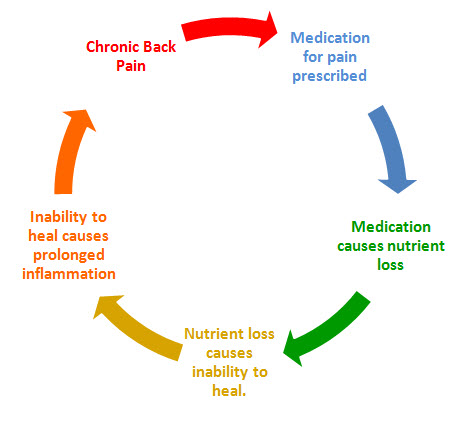
supports consuming eggs in moderation after finding no
evidence that eggs increase the risk of cardiovascular disease.
The researchers studied the association between egg consumption and
cardiovascular disease in 21,327 participants from the Physicians’
Health Study.
The end result of the study found that egg consumption was not
associated with incident heart attack or stroke.
Source: American Journal of Clinical Nutrition
Vol. 87, No. 4, 964-969, April 2008
_________________________________________________________
Dr. Osborne’s comment:
I have been an a long time supporter of the incredible edible egg.
However, eating the right type of egg is important. Organic, free range
eggs should be the egg of choice. Standard commercial eggs come
from hens that are cooped up in boxes and fed chemically sprayed
grains. This changes the chemical composition of the egg.
One of the greatest misconceptions in the health industry is that eating
foods with high cholesterol will increase the risk of cardiovascular
disease. The liver is responsible for approximately 90-95% of your
daily cholesterol production. So eating cholesterol foods do not have
as great an impact on cholesterol as promoted. An egg contains about
210 mg of cholesterol.
Dietary causes of increased cholesterol are the over consumption of
processed meats, grains, and sugars. Additionally these foods have all
been shown to stimulate an immune response in the body.
Interestingly enough, these immune responses are lessened by the
formation of cholesterol. That being said, cholesterol is increased
during times of immune distress to help the body not to hurt it.
Think about that last sentence for a minute. If elevated cholesterol
helps the immune system, does lowering cholesterol with medications
create immune system dysfunction. A number of studies support this
to be the case. Additionally, a number of studies have concluded that
elevated cholesterol is not as great a risk factor for heart disease as is
promoted. As a matter of fact, studies have proven that people with
the lowest cholesterol have a higher mortality rate (die sooner)!
Below are a number of the benefits of cholesterol
Cholesterol helps the immune system to fight infections
Cholesterol is a precursor to the hormones estrogen,
progesterone, cortisol, and testosterone.
Cholesterol allows brain cells to form synapses (bridges that help
brain cells communicate with each other.)
References:
Krumholz HM and others. Lack of association between cholesterol
and coronary heart disease mortality and morbidity and all-cause
mortality in persons older than 70 years. Journal of the American
Medical Association 272, 1335-1340, 1990
Ravnskov U. High cholesterol may protect against infections and
atherosclerosis. Quarterly Journal of Medicine 96, 927-934, 2003.
Jacobs D and others. Report of the conference on low blood
cholesterol: Mortality associations. Circulation 86, 1046–1060,
1992.
A new study in the American Journal of Clinical Nutrition supports consuming eggs in moderation after finding no evidence that eggs increase the risk of cardiovascular disease.
The researchers studied the association between egg consumption and cardiovascular disease in 21,327 participants from the Physicians’ Health Study. The end result of the study found that egg consumption was not associated with incident heart attack or stroke.
Source: American Journal of Clinical Nutrition Vol. 87, No. 4, 964-969, April 2008.
 Dr. Osborne’s comment:
Dr. Osborne’s comment:
I have been an a long time supporter of the incredible edible egg. However, eating the right type of egg is important. Organic, free range eggs should be the egg of choice. Standard commercial eggs come from hens that are cooped up in boxes and fed chemically sprayed grains. This changes the chemical composition of the egg. One of the greatest misconceptions in the health industry is that eating foods with high cholesterol will increase the risk of cardiovascular disease. The liver is responsible for approximately 90-95% of your daily cholesterol production. So eating cholesterol foods do not have as great an impact on cholesterol as promoted. An egg contains about 210 mg of cholesterol. Dietary causes of increased cholesterol are the over consumption of processed meats, grains, and sugars. Additionally these foods have all been shown to stimulate an immune response in the body. Interestingly enough, these immune responses are lessened by the formation of cholesterol. That being said, cholesterol is increased during times of immune distress to help the body not to hurt it.
Think about that last sentence for a minute. If elevated cholesterol helps the immune system, does lowering cholesterol with medications create immune system dysfunction. A number of studies support this to be the case. Additionally, a number of studies have concluded that elevated cholesterol is not as great a risk factor for heart disease as is promoted. As a matter of fact, studies have proven that people with the lowest cholesterol have a higher mortality rate (die sooner)!
Below are a number of the benefits of cholesterol
- Cholesterol helps the immune system to fight infections
- Cholesterol is a precursor to the hormones estrogen, progesterone, cortisol, and testosterone.
- Cholesterol allows brain cells to form synapses (bridges that help brain cells communicate with each other.)
References:
- Krumholz HM and others. Lack of association between cholesterol and coronary heart disease mortality and morbidity and all-cause mortality in persons older than 70 years. Journal of the American Medical Association 272, 1335-1340, 1990.
- Ravnskov U. High cholesterol may protect against infections and atherosclerosis. Quarterly Journal of Medicine 96, 927-934, 2003.
- Jacobs D and others. Report of the conference on low blood cholesterol: Mortality associations. Circulation 86, 1046–1060, 1992.
![]() Dr. Osborne’s comment:
Dr. Osborne’s comment:














